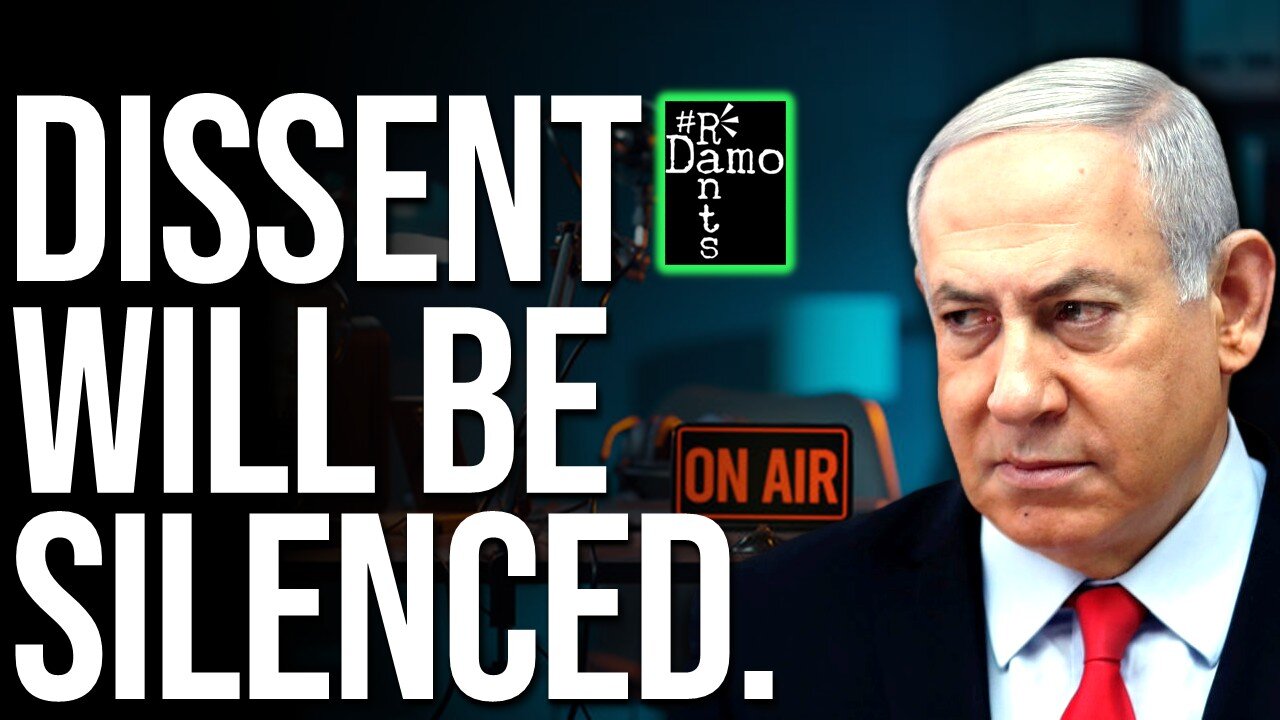Premium Only Content

Israel Is Silencing Its Radio — Because the Propaganda Fell Flat
Right, so Israel is closing its own army radio because it wasn’t obedient enough. That’s the line. Defence Minister Israel Katz says Galei Tzahal, the IDF’s station, has “harmed morale” and “dragged the army into politics.” The rough translation of that basically meaning: it stopped sounding like propaganda and we can’t have that. Broadcasts end 1 March 2026 if he gets his way. But this same week, the Knesset moved to make the so-called Al Jazeera Law permanent — the one that lets the government shut any foreign outlet without a court order. Both moves wrapped in the same excuse: national security, morale, unity. Two fronts of the same information war — one silencing the soldiers, the other gagging the press. Israel calls this protecting democracy. The rest of the world calls it censorship with better paperwork. The state will control the narrative and will control the flow of information Israelis receive. The microphones aren’t broken. They’re just being switched off by design.
Right, so Israel is shutting down its own army radio. The order comes from the eternally deranged Defence Minister Israel Katz. He says the station, Galei Tzahal, no longer serves the soldiers. He says it has become political, that it undermines morale, that it drags the army into the fight of opinion. He plans to submit a proposal to cabinet to close it, with broadcasts to end on 1 March 2026. The justification is written in the language of neutrality, as if Israel, when it comes to information is ever such a thing. The intention sits elsewhere. A government that already controls most of the country’s information space now moves to close the one outlet inside the military that still manages to carry a real debate.
Army Radio was founded in 1950 as a morale tool, the soldiers’ link to home. Over time it became something different. Civilians joined the newsroom. Journalists questioned ministers – well how dare they? Soldiers presented music shows that strayed into politics. The line between army and public blurred, and for decades that blur has worked just fine. It was the sound of a conscript army talking to itself. By 2024, with the country under permanent mobilisation and dissent inside the ranks rising over the unending violence and forever war that was required to keep Netanyahu in power, that openness became a liability to those for whom control has become everything. Katz calls it an anomaly. He says no other democracy allows a military station to air criticism of the army and he doesn’t mean that as praise.
The formal wording came first through the advisory committee he created – conveniently – last month. It concluded that Galei Tzahal’s news division had become “too political” - a news station being political, well can you imagine? And therefore he has recommended closure. Its companion station, Galgalatz, the music-only channel, could stay. That was the compromise: entertainment without scrutiny. When Katz announced his plan, he repeated the committee’s logic nearly word for word. He said the broadcasts harmed the war effort and morale. He said enemies might interpret them as official messages. He said the army’s neutrality was at risk. He offered a solution that preserves neutrality by eliminating free speech.
The reaction inside Israel, given how on the nose and obvious what this is really about, has been nothing short of predictable. Tal Lev Ram, the station’s chief, called it a “serious and unfortunate blow to freedom of the press.” The Israel Press Council issued a statement saying only the Knesset can lawfully close the station because its existence is anchored in legislation. Katz has no such authority. He can propose, not abolish. If he pushes ahead without a vote, the case will go to the High Court. The Attorney-General, Gali Baharav-Miara, already warned that the review process smacks of political intervention in public broadcasting. Yet the political direction is set. Katz has the coalition behind him and a press environment already conditioned to treat dissent as sedition.
A survey by the Israel Democracy Institute last year found 59 percent of Israelis opposed closing Army Radio. That number cuts through the official line that the station is out of step with the public. It shows a public still aware that information freedom matters, even under siege. It also shows how little that awareness now counts for anything. The government’s approach to communication has moved from persuasion to management. When half the population no longer believes it controls what it hears, the answer from above is not reform but tighter filters.
What makes Katz’s move more than an internal media story is the timing. The week he promised to shutter Army Radio, the Knesset advanced another law. The so-called Al Jazeera Law — first passed as a temporary wartime measure in April of last year, but which was really about information control again as Al Jazeera were broadcasting very much what was happening in Gaza at Israel’s hands and Israel couldn’t stand that, you only need look at all the journalists that have been killed by Israeli actions to know that — is now being made permanent. Likud MK Ariel Kallner sponsored the bill. It passed its preliminary reading yesterday 11th November. The amendment removes the six-month sunset clause and the wartime restriction. It allows the government to close foreign media at any time, seize equipment, and block websites, without prior judicial approval. At a time when more journalists worldwide are demanding to be let in, Israel is placing even more barriers in the way. Communications Minister Shlomo Karhi said the change ensures that “no enemy propaganda will operate from within Israel again.” So who in army radio is an enemy then, given they are getting the same treatment if Katz gets his way? The alignment of language between Katz and Karhi is not a coincidence. Both cast information itself as another battlefield.
The first version of the Al Jazeera Law was justified as a temporary defence against hostile media during the Gaza campaign. It gave the Prime Minister and the Communications Minister joint power to shut foreign outlets in wartime. To try and censure Israeli atrocity was the truth of the matter. The permanent version converts emergency authority into routine governance though, means that war on information, on the truth, is here to stay. It writes censorship into peacetime law. Reports have recorded that this expansion lets closures run indefinitely, based on harm to “security, foreign relations or morale.” The word morale appears again. It has become the universal solvent for rights. When morale is invoked, oversight dissolves.
Opposition leader Yair Lapid told the Knesset the law allows any critical outlet to be silenced by rebranding it as a threat. The Israel Press Council called it a framework for prior restraint. The Foreign Press Association warned that “no due-process safeguard remains.” They are right. Judicial review now comes after the closure, not before. The outlet disappears first, argues later. In practice that means there is no argument at all. Meaning just the propaganda remains. This is how temporary powers survive: the state discovers it likes them.
Set beside Katz’s order, the pattern is exact. One law targets the external voice, the other the internal one. Together they build an information perimeter around the state. Inside that perimeter, the army speaks only through approved channels. Outside it, foreign reporters operate under threat of closure if they say the wrong thing. The truth as that would undoubtedly be. The distance between government, military, and media collapses into a single command structure. The mechanism is legal; but the effect is total.
Israel has been here before as well. In 2017 the then Netanyahu government liquidated the Israel Broadcasting Authority and replaced it with Kan, a new corporation under closer ministerial control. The justification was the same: efficiency, depoliticisation, neutrality. What disappeared were the investigative programmes that challenged policy. So the precedent was clear. When politicians promise neutrality, they mean obedience and we’re seeing that repeated again now.
Globally, the same playbook runs from Ankara to Budapest. Erdoğan’s purge of TRT journalists in 2016 was justified as keeping politics out of public service. Orbán’s 2010 media merger in Hungary was sold as professionalism. In each case, “non-partisan” became code for “aligned.” Katz now joins that club. His claim that “operating a civilian radio station by the military is an anomaly with no parallel in any democratic country” is technically true. The rest of the world’s armies don’t need one. Their civilian media already carry those messages.
Inside Israel, Army Radio was never radical. It stayed within the patriotic consensus, but it allowed argument. That margin of argument is what defines a democracy. Closing it is not about what was said on air; it is about who decides what may be said next. The soldiers who once phoned in song requests will now hear only music curated for morale. The journalists who questioned the war’s direction will be reassigned or silenced. Katz calls that restoring discipline. But really it’s a government that only wants to hear itself talk.
The legal fight will come, but the cultural shift has already happened. The coalition treats information control as an operational front. The Al Jazeera Law turns foreign scrutiny into an act of hostility. The Army Radio closure treats internal discourse the same way. Both moves claim to defend Israel’s security. Both redefine security as narrative unity. The result is a permanent state of emergency in communication.
There is a phrase running through all the official statements: “protect morale.” It appears in Katz’s order, in Karhi’s defence of the censorship bill, in Netanyahu’s earlier decrees against foreign outlets. Morale has become a catch-all for obedience. When a government equates disagreement with demoralisation, it is no longer protecting soldiers; it is protecting itself from its own citizens. The shift is semantic but it’s absolute. Criticism of the war becomes betrayal. Scepticism becomes sabotage.
Public reaction is still divided but muted. Surveys show majority opposition to closing the station, yet demonstrations are small. Many Israelis have grown accustomed to the idea that national security justifies everything. Others have tuned out. The press still reports the facts, but the frame is shrinking. Each outlet that resists is accused of aiding the enemy. Each journalist who persists does so under warning. The chilling effect is policy by other means.
The legal architecture now allows it. The Al Jazeera Law eliminates prior judicial oversight. Katz’s decree, if implemented without legislation, will test the boundaries of ministerial power. If the High Court strikes it down, the coalition can still legislate closure later. Either way, the precedent is planted: dissent within a state broadcaster is grounds for dissolution. Foreign reporting that undermines morale is grounds for expulsion. Those definitions can stretch indefinitely.
The language of security has become the language of rule. Israel’s communications system is being militarised in peacetime. Information is being treated as territory to occupy. This isn’t democracy, this is police state stuff. The process is administrative, not dramatic. Committees, cabinet votes, amendments. Each presented as routine housekeeping. That is how democracies erode — through paperwork that no one resists until the voices are already gone.
Army Radio’s journalists have promised to fight the closure “by every means.” They will petition the court. They will appeal to public memory of what the station once represented. They will probably lose. The government can wait them out. By March 2026 the transmitters can be switched off without public shock. People will still have music. They just won’t have argument. And what passes for news will have become less so.
When Katz says this move keeps politics out of the army, he is telling the truth in his own way. Politics will be reserved for the cabinet, not the barracks. The soldiers will have playlists instead of questions. The public will have security briefings instead of debate. And the government will call that unity.
A democracy does not end with a coup. It ends when a state no longer trusts its own people to hear the truth from its own microphones. That is what this closure represents. The Al Jazeera Law cements it. The rest is maintenance.
While Israel might fancy shutting down its army radio might solves some propaganda problems, another one looms on the horizon, as Iran prepared to launch a Hebrew news channel and beam it straight into Israel! Private satellite feeds, broadcasts across social media channels, Israel can switch off microphones at a radio station but that presents a bigger problem for them that they might not be able to contain. Get all the details of that story here.
Please do also hit like, share and subscribe if you haven’t done so already so as to ensure you don’t miss out on all new daily content as well as spreading the word and helping to support the channel at the same time which is very much appreciated, holding power to account for ordinary working class people and I will hopefully catch you on the next one. Cheers folks.
-
 17:37
17:37
MetatronHistory
19 hours agoThe REAL Origins of the GREEKS
1215 -
 1:19:32
1:19:32
The Daily Signal
4 hours ago $1.05 earned🚨BREAKING: James Comey & Letitia James NOT "Off the Hook" on Indictments, Sen. Kelly Court Martial?
591 -
 LIVE
LIVE
Drew Hernandez
19 hours agoBONDI DOJ BLOWS IT ON COMEY/LETICIA INDICTMENTS?!
813 watching -
 UPCOMING
UPCOMING
PandaSub2000
4 days agoLIVE 10:30pm ET | CARMEN SANDIEGO
175 -
 12:10
12:10
Robbi On The Record
23 hours ago $0.43 earnedKarmic Disclosure and Predictive Programming
4042 -
 4:57
4:57
Gamazda
2 hours ago $0.21 earnedAerosmith - Dream On (Piano by Gamazda)
1623 -
 8:12
8:12
Freedom Frontline
5 hours agoChip Roy DESTROYS Democrat After She Explodes Over Shutdown Truth
96 -
 LIVE
LIVE
We Like Shooting
14 hours agoWe Like Shooting 638 (Gun Podcast)
164 watching -
 46:09
46:09
MattMorseTV
2 hours ago $12.61 earned🔴Bondi just DROPPED the BALL... BIG TIME.🔴
8.69K67 -
 23:57
23:57
Jasmin Laine
6 hours agoCarney SNAPS at Reporters—MOCKS Trump and it BACKFIRES IMMEDIATELY
4.06K21